If you’re seeking the best Ikigai books in English to discover your purpose, I recommend exploring titles like *IKIGAI and Japanese Philosophy*, *How to Find Your Ikigai in 21 Days*, and *The Japanese Secret to a Long and Happy Life*. These cover practical exercises, cultural insights, and step-by-step plans for meaningful living. Keep exploring, and you’ll find the perfect guide to inspire your journey toward purpose and fulfillment.
Key Takeaways
- Highlight books that combine Japanese philosophies like Ikigai, Kaizen, and Hansei for personal purpose discovery.
- Emphasize practical guides with step-by-step plans, exercises, and reflection prompts to foster meaningful change.
- Prioritize titles with cultural depth, authentic insights, and credible authors experienced in Japanese traditions and mindfulness.
- Include resources featuring visual aids like diagrams and charts for clearer understanding of Ikigai concepts.
- Focus on accessible, actionable books suitable for beginners seeking clarity, purpose, and long-term personal growth.
IKIGAI and Japanese Philosophy: 3 Books in 1
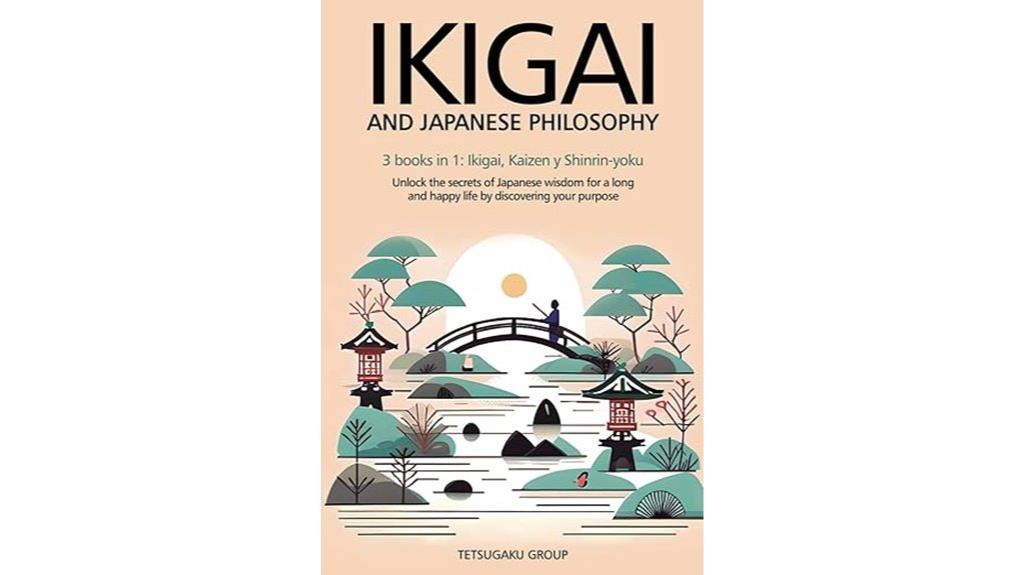
If you’re new to Japanese philosophies like Ikigai, Kaizen, and Shinrin-yoku, this book offers a straightforward introduction by combining all three concepts in one volume. I found it helpful for understanding how these ideas promote purpose, continuous growth, and health through nature. The book explains each philosophy clearly and provides practical exercises to apply them in daily life. While some parts felt superficial or repetitive, it’s a good starting point for beginners seeking a holistic approach to well-being. Just keep in mind that it may lack depth, so consider exploring more detailed resources later on.
Best For: beginners interested in gaining a simple overview of Japanese philosophies like Ikigai, Kaizen, and Shinrin-yoku to promote well-being and self-awareness.
Pros:
- Provides a clear and accessible introduction to three key Japanese philosophies.
- Includes practical exercises for daily application and self-reflection.
- Offers a holistic approach to purpose, growth, and health suitable for newcomers.
Cons:
- Contains repetitive and superficial content with minimal depth.
- Criticized for poor editing, large fonts, and low-quality production.
- Lacks original insights, often rehashing basic ideas available online.
How to Find Your Ikigai: Master Japanese Wisdom in 21 Days
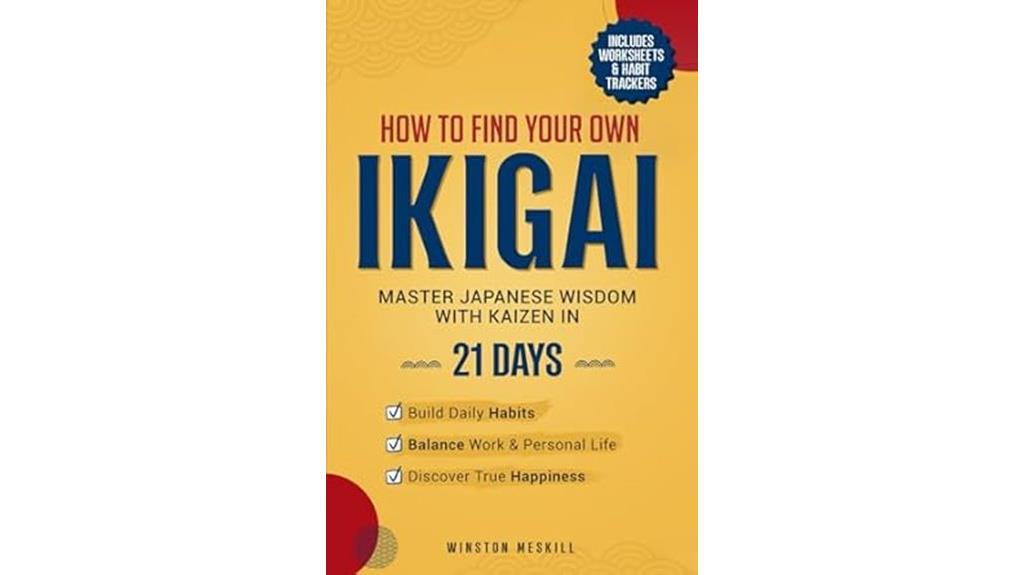
This guide is perfect for anyone enthusiastic to uncover their purpose through practical, step-by-step methods rooted in Japanese wisdom. Over 21 days, it offers manageable daily actions grounded in Ikigai and Kaizen, encouraging small habits that build toward meaningful change. Each day presents simple exercises like journaling, gratitude, and reflection, helping you discover your passions and purpose without feeling overwhelmed. The structured plan makes progress achievable, fostering a sense of balance and fulfillment. Supported by useful tools and cultural insights, this approach transforms the journey to your Ikigai into an accessible, stress-free process you can sustain long-term.
Best For: individuals seeking a practical, gentle, and culturally inspired approach to discover their purpose and cultivate meaningful habits over a manageable 21-day period.
Pros:
- Provides a clear, step-by-step plan with daily actionable exercises that are easy to follow.
- Incorporates practical tools like journaling prompts and reflection activities to deepen self-awareness.
- Emphasizes small, sustainable changes rooted in Japanese philosophies, making personal growth feel achievable and stress-free.
Cons:
- May require dedication to consistently complete daily exercises over the 21 days.
- Some users might prefer more in-depth or advanced strategies beyond beginner-friendly methods.
- Cultural insights and philosophies may feel less relatable to those unfamiliar with Japanese traditions.
Ikigai: The Japanese Secret to a Long and Happy Life
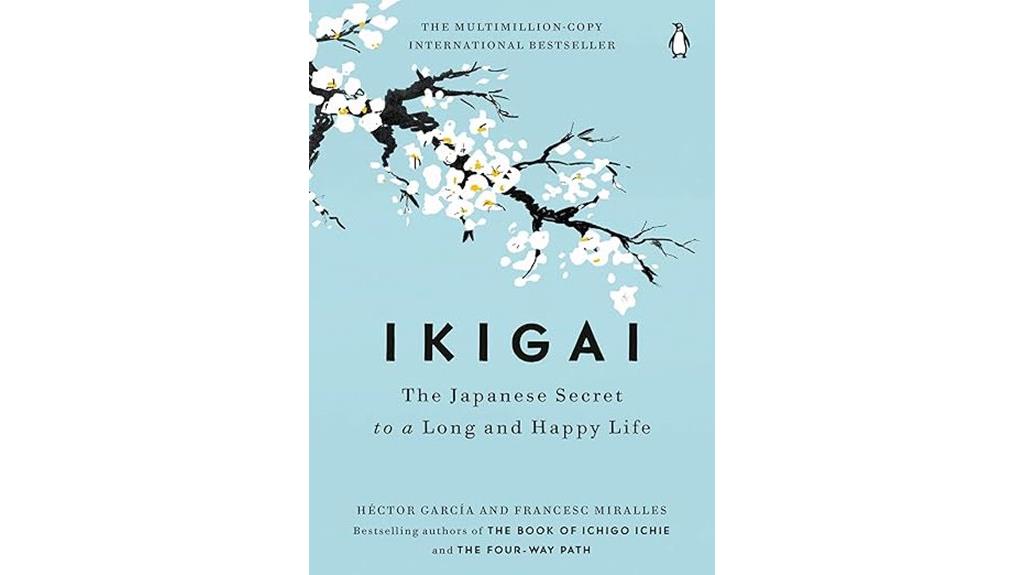
Anyone seeking a practical, culturally rich guide to discovering their purpose will find *Ikigai: The Japanese Secret to a Long and Happy Life* a perfect starting point. This book explores the Japanese concept of ikigai, which combines passion, profession, vocation, and mission to foster fulfillment and happiness. It explores Okinawa’s long-lived residents and cultural principles like wabi-sabi and ichi-go ichi-e, blending Eastern philosophies with modern research. With actionable exercises and reflective questions, it guides readers toward living intentionally. The book highlights how embracing ikigai supports longevity, mental resilience, and overall well-being, making it an inspiring resource for anyone seeking a meaningful, joyful life.
Best For: individuals interested in personal development, cultural insights, and practical strategies for living a fulfilled and meaningful life.
Pros:
- Provides a rich blend of cultural stories, philosophies, and research that deepen understanding of happiness and longevity.
- Offers practical exercises and reflective questions to help readers discover and incorporate their ikigai into daily routines.
- Engaging, accessible writing style that appeals to a broad audience seeking motivation and personal growth.
Cons:
- Some readers may find the cultural references and philosophies less applicable to Western contexts.
- The book’s focus on Okinawa’s lifestyle might feel less relevant for those living in different environments.
- As a general guide, it may lack specific, detailed steps for complex personal or professional life challenges.
Ikigai and Japanese Philosophy: 3 Books in 1
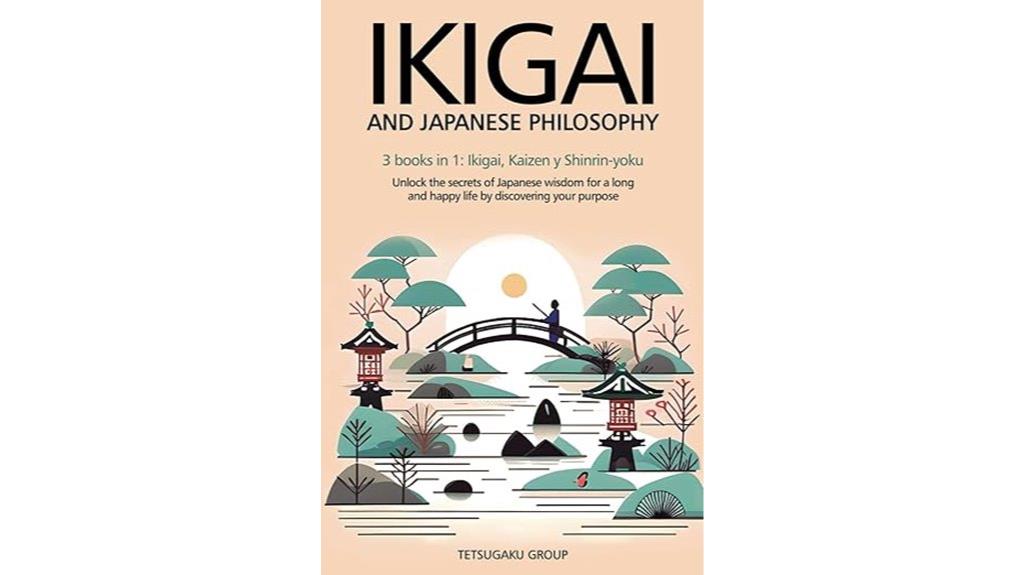
Those interested in exploring Japanese philosophies beyond just Ikigai will find the “Ikigai and Japanese Philosophy: 3 Books in 1” particularly valuable. This book introduces three core concepts: Ikigai, Kaizen, and Shinrin-yoku, offering a holistic view of Japanese approaches to purpose, growth, and well-being. It provides practical exercises to help align your passions, embrace continuous improvement, and connect with nature for health. While some praise its inspiring insights, others criticize it for superficial content and poor editing. Still, it’s a helpful starting point for those curious about integrating these philosophies into their lives, though deeper resources may be necessary for lasting impact.
Best For: those curious about introductory Japanese philosophies like Ikigai, Kaizen, and Shinrin-yoku who want a broad overview and practical tips, but are aware of potential superficial content.
Pros:
- Offers a simple introduction to three key Japanese philosophies with practical exercises
- Promotes mindfulness, self-reflection, and holistic well-being
- Provides accessible entry points for beginners interested in personal growth
Cons:
- Frequently criticized for repetitive, superficial content with little depth
- Poor editing and production quality may detract from the reading experience
- Lacks original insights, with some content feeling filler or AI-generated
Ikigai: The Japanese Art of a Meaningful Life
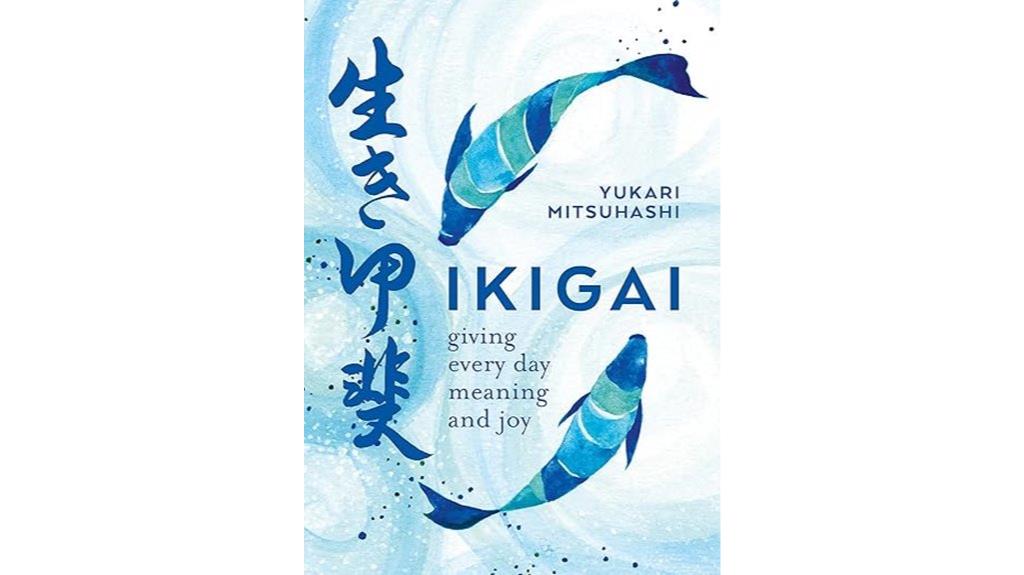
Are you searching for a practical way to understand how Japanese culture shapes the pursuit of a meaningful life? “Ikigai: The Japanese Art of a Meaningful Life” offers a compelling introduction, especially for readers interested in how everyday actions and personal passions contribute to a sense of purpose. The book explains that ikigai isn’t a rigid skill but a presence woven into daily life. Author Yukari Mitsuhashi shares stories from diverse Japanese individuals, showing how ikigai manifests across careers, hobbies, and personal pursuits. It’s a helpful, accessible guide that encourages reflection on finding joy in small moments and integrating passions into your routine.
Best For: individuals interested in exploring how daily actions, passions, and cultural insights contribute to a meaningful and fulfilling life through the lens of Japanese traditions.
Pros:
- Provides accessible and practical guidance on discovering and integrating ikigai into everyday life
- Shares diverse stories that illustrate how ikigai manifests across different personal and professional pursuits
- Encourages reflection on small, meaningful moments to foster happiness and purpose
Cons:
- Some examples focus mainly on high-achieving individuals, which may feel less relatable to everyday readers
- The abstract nature of ikigai can make it challenging to apply concrete steps for everyone
- Limited focus on how individuals with less traditional passions or different lifestyles can find their ikigai
My Little Ikigai Journal
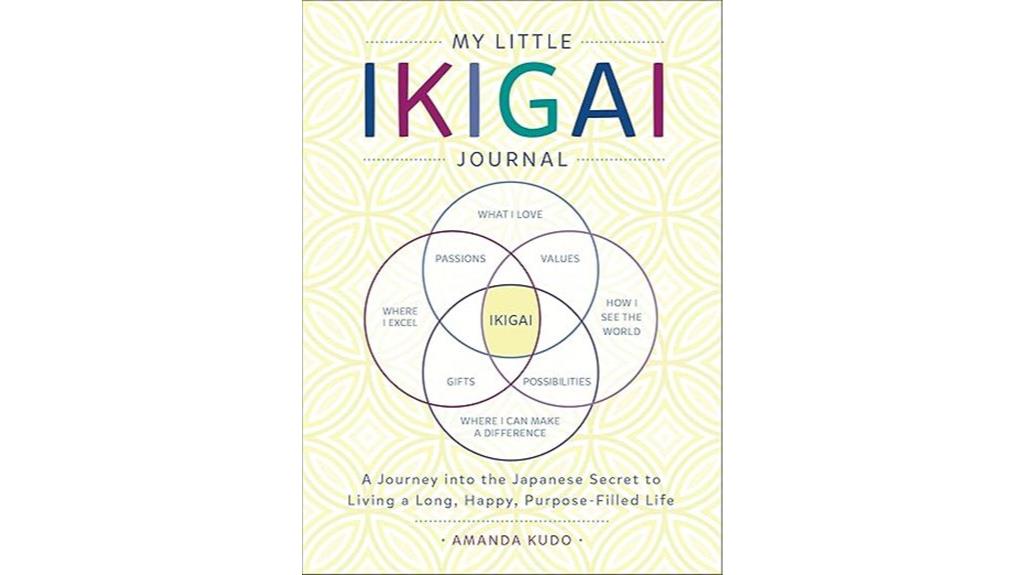
The My Little Ikigai Journal stands out as an ideal starting point for individuals new to the concept of ikigai, especially if you’re seeking a simple, engaging way to explore your purpose. It features provocative questions, inspiring quotes, and beautiful origami-inspired designs that encourage reflection. Designed for beginners, it helps you explore into your passions, strengths, and values by exploring your past and present experiences. The active format prompts thoughtful responses, making self-discovery accessible and meaningful. Whether you’re in progression or simply seeking clarity, this journal offers a practical, approachable tool to guide you toward a more purposeful life.
Best For: individuals seeking a simple, engaging introduction to exploring their purpose and passions through reflective questions and visual inspiration.
Pros:
- User-friendly format designed for beginners and those new to ikigai
- Encourages active self-reflection with thought-provoking questions and inspiring quotes
- Beautiful origami-inspired designs enhance the reflective experience
Cons:
- May require additional resources for deeper exploration of ikigai concepts
- Limited for those seeking advanced or comprehensive personal development tools
- Some questions might be confronting or challenging for sensitive individuals
EFINITO Ikigai: Japanese Secret to a Long and Happy Life Book
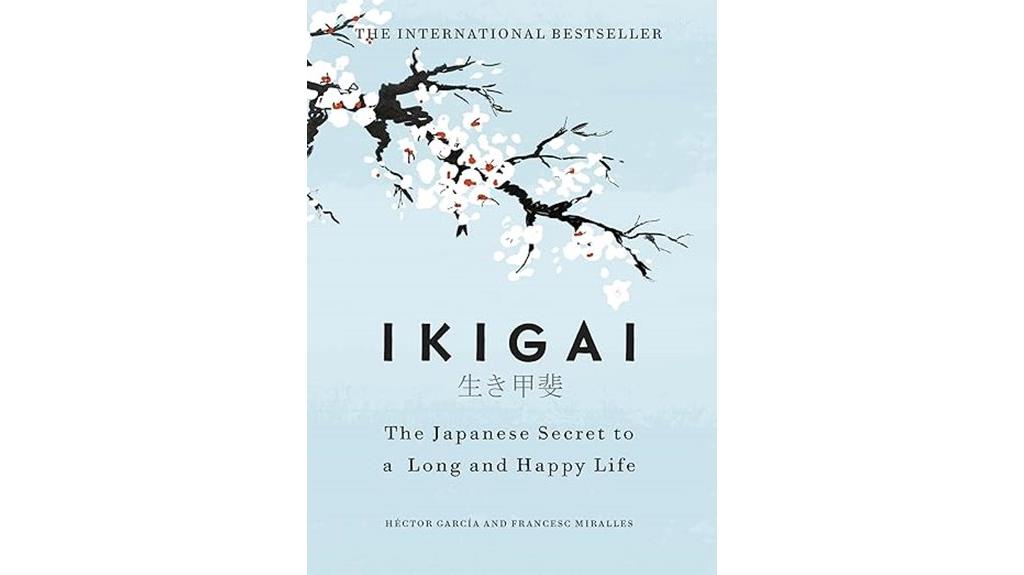
If you’re seeking a deeply meaningful and culturally rich introduction to Japanese wisdom on longevity and happiness, EFINITO Ikigai: Japanese Secret to a Long and Happy Life stands out. This book leaves a lasting impression, offering sacred insights that can truly change your perspective. It introduces Japanese principles around diet, mental discipline, focus, and purpose, inspiring reflection and action. Its small, accessible format makes it easy to immerse yourself in and share with loved ones. More than just a quick read, it sparks curiosity about Japanese traditions and motivates further exploration. I found it beautifully provocative, with teachings that resonate deeply, making it highly recommended for anyone seeking a purposeful, joyful life.
Best For: those interested in exploring Japanese culture and philosophy to find inspiration for a long, happy, and purposeful life.
Pros:
- Offers sacred, culturally rich insights that can inspire personal growth and reflection
- Short, accessible format makes it easy to read and share with others
- Sparks curiosity and motivation for further research into Japanese traditions and philosophies
Cons:
- May provide only a surface-level overview, prompting further exploration for deeper understanding
- Focused primarily on Japanese principles, which might limit applicability for some readers
- As a quick read, it may not delve into detailed practical steps for implementation
IKIGAI, KAIZEN & HANSEI Book on Japanese Wisdom and Daily Reflections
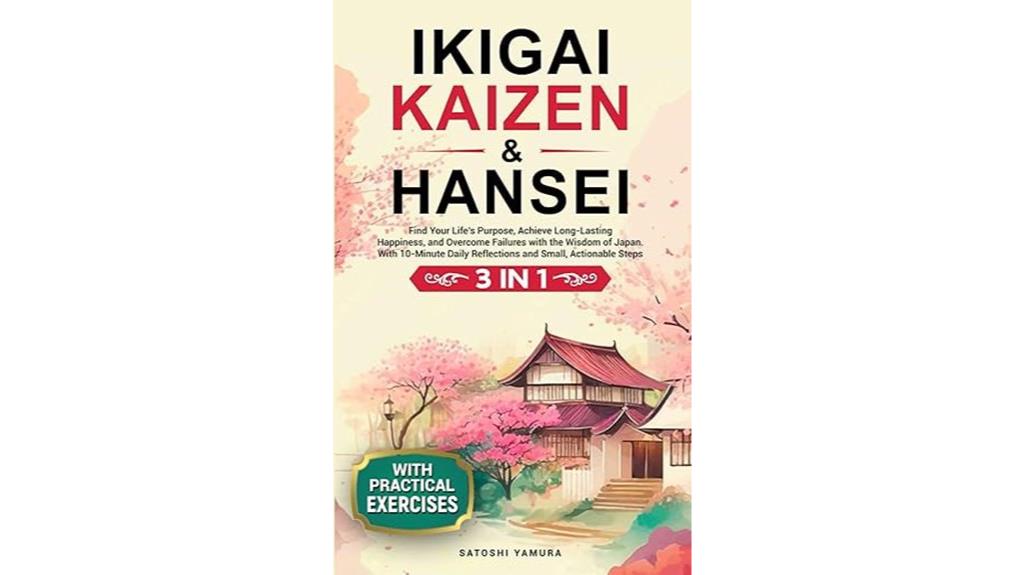
This book on Japanese wisdom, focusing on Ikigai, Kaizen, and Hansei, is an excellent choice for anyone seeking practical ways to deepen self-awareness and cultivate a more meaningful, balanced life. It offers clear, actionable exercises like meditation, self-assessment, and creating personal Ikigai blueprints, all designed for just 10-minute daily reflections. These small steps make embracing Japanese philosophies accessible and manageable. By integrating these concepts into everyday routines, you’ll develop resilience, clarity, and purpose. The book’s cultural insights and real-life examples enrich your understanding, helping you apply these ancient principles for lasting happiness and continuous growth.
Best For: individuals seeking practical, daily guidance to enhance self-awareness, purpose, and resilience through Japanese philosophies.
Pros:
- Offers concise, actionable exercises suitable for 10-minute daily reflections.
- Combines cultural insights with real-life examples to deepen understanding.
- Promotes continuous growth, self-assessment, and long-term happiness through simple practices.
Cons:
- May require consistent daily commitment to see significant results.
- Some readers might find cultural context less applicable to their lifestyle.
- The focus on Japanese traditions might feel less relatable for those unfamiliar with cultural nuances.
The Ikigai Journey: A Practical Guide to Finding Happiness and Purpose
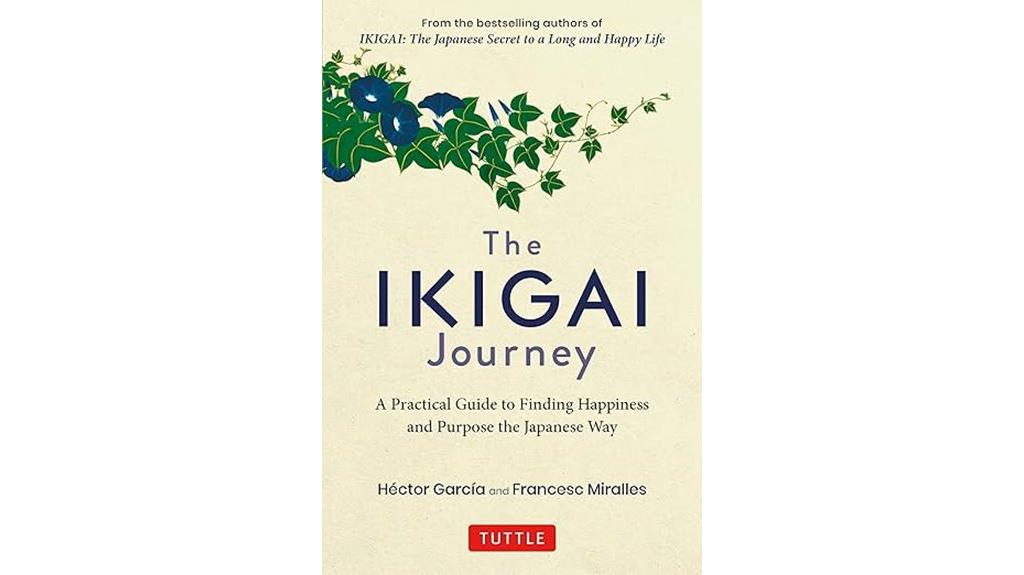
Anyone feeling lost or uncertain about their life’s direction will find “The Ikigai Journey” especially helpful. This practical guide dives into the Japanese concept of ikigai, offering clear steps to discover happiness and purpose. The authors use metaphors like a bullet train to illustrate life’s stages, making personal growth feel manageable. It emphasizes that knowing isn’t enough—doing the work through exercises and reflection is key. Readers often experience a positive shift, gaining confidence and clarity. Perfect for those in progression, this book provides reassurance, practical tools, and a fresh perspective to help you find meaning and direction in everyday life.
Best For: individuals feeling lost or uncertain about their life’s direction who seek practical guidance to discover happiness and purpose through personal reflection and growth.
Pros:
- Provides clear, accessible insights into the Japanese concept of ikigai, making complex ideas easy to understand.
- Uses engaging metaphors like a bullet train journey to illustrate different life stages, aiding comprehension of personal development.
- Emphasizes actionable exercises and reflection, encouraging real-world application and meaningful transformation.
Cons:
- The physical condition of the book may vary, which could affect the reading experience for some.
- Some readers might find the cultural references more appealing if they have an interest in Japanese lifestyle and wellness.
- The focus on self-reflection and exercises may require dedicated time and commitment, which could be challenging for busy individuals.
Awakening Your Ikigai: How the Japanese Wake Up to Joy and Purpose Every Day
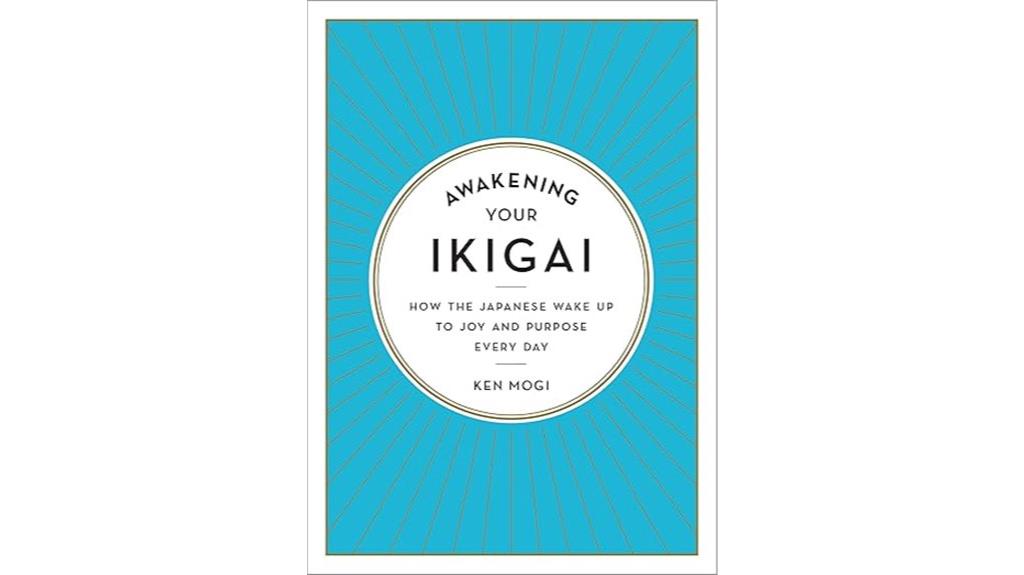
Those seeking a practical and culturally rich approach to discovering daily joy and purpose will find “Awakening Your Ikigai” particularly valuable. Ken Mogi, a respected Japanese neuroscientist, combines scientific insights with Japanese cultural wisdom to show how ikigai—life’s purpose—can be embraced every day. He introduces five pillars: starting small, releasing oneself, harmony, appreciating small things, and being present. Through relatable stories from Japanese professionals, Mogi illustrates how mindfulness and simple, intentional actions foster happiness. His approach encourages us to find purpose in everyday moments, making joy and meaning accessible regardless of where we live.
Best For: individuals interested in exploring Japanese philosophies, mindfulness practitioners, and anyone seeking practical guidance on finding daily purpose and happiness.
Pros:
- Combines scientific insights with rich cultural wisdom for a well-rounded perspective
- Provides practical, actionable principles like starting small and being present
- Uses relatable stories from Japanese professionals to illustrate concepts effectively
Cons:
- Some stories may feel repetitive or somewhat forced to certain readers
- The brevity of the book might leave some readers wanting more depth on certain topics
- Focus on Japanese examples may seem less immediately applicable to those unfamiliar with the culture
Ikigai, Kaizen & Hansei Book: Japanese Secrets for a Meaningful Life
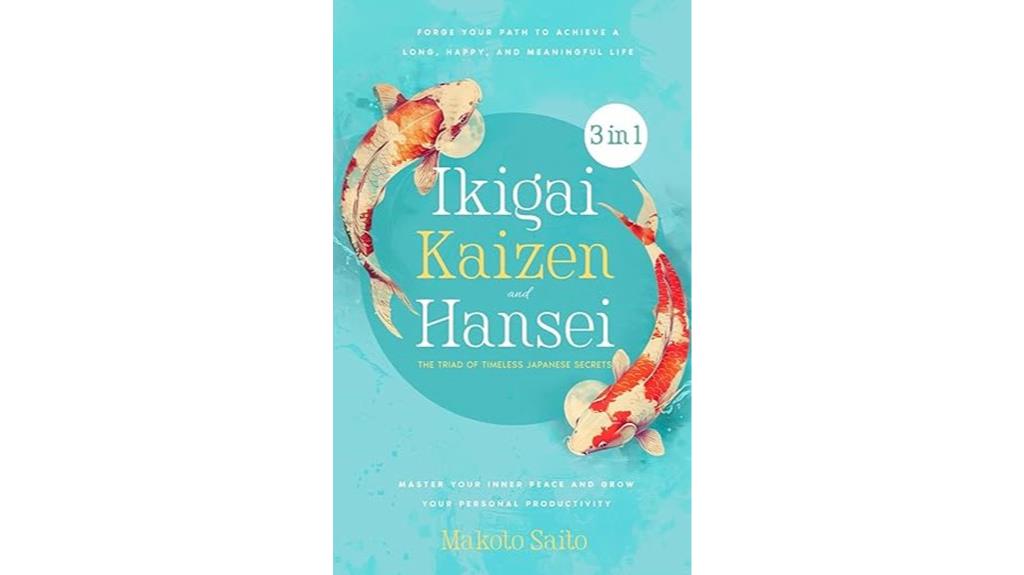
If you’re seeking practical ways to find balance and purpose in your life, the “Ikigai, Kaizen & Hansei” book offers valuable insights rooted in Japanese philosophies. It introduces core principles like Ikigai, which guides you to explore your purpose across body, mind, and spirit. Kaizen emphasizes small, continuous improvements, while Hansei encourages honest self-reflection for growth. I found its practical tools—meditation, mindfulness, and self-assessment—helpful for slowing down and gaining clarity. The book’s straightforward wisdom makes these ancient concepts accessible, inspiring you to make meaningful changes, embrace imperfections, and live intentionally. It’s a compelling guide for personal growth and inner peace.
Best For: individuals seeking practical guidance on integrating Japanese philosophies like Ikigai, Kaizen, and Hansei into their personal growth and daily life for greater purpose and inner peace.
Pros:
- Offers clear, accessible explanations of complex Japanese concepts for easy understanding.
- Provides practical tools such as meditation, mindfulness, and self-reflection techniques.
- Inspires continuous improvement and self-awareness through actionable insights.
Cons:
- Cover design and writing style may feel unremarkable or less engaging to some readers.
- Perceived as overpriced relative to the depth of content provided.
- Lacks extensive historical context or detailed explanations, which some readers may desire.
Little Book Of Ikigai
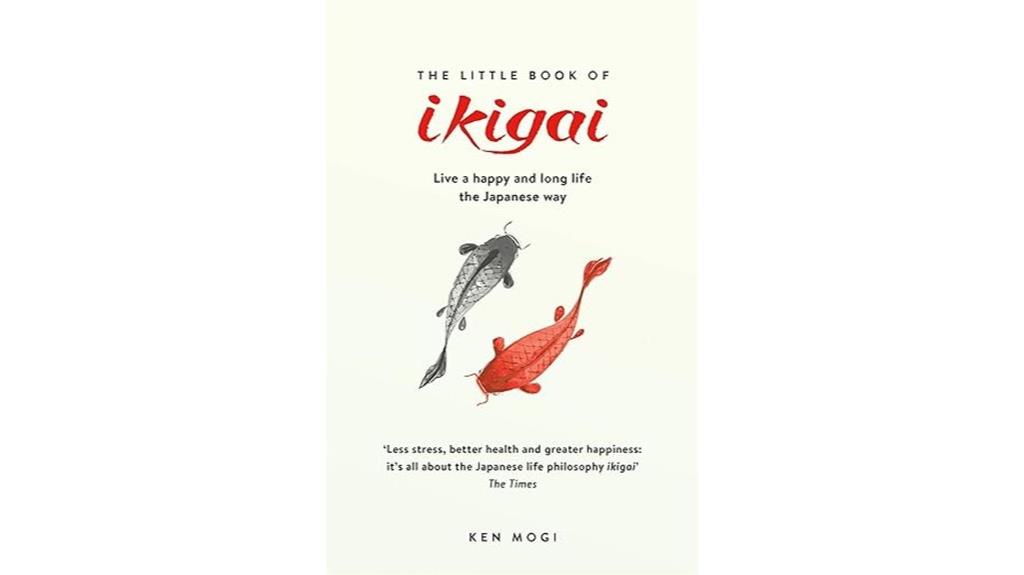
The Little Book Of Ikigai stands out as an ideal choice for readers seeking a gentle, accessible introduction to Japanese philosophy. It offers cultural insights, emphasizing that Ikigai isn’t just about work or money but about finding joy and purpose in everyday life. The author highlights that doing what brings fulfillment matters more than financial gain, making it approachable for anyone. Short and meditative, it’s perfect for morning reflection with tea or coffee. Filled with real-life examples from Japan, this book encourages self-discovery and mindfulness. It’s a calming, inspiring read that deepens your understanding of Ikigai and Japanese culture without feeling overwhelming.
Best For: those interested in a gentle, culturally insightful introduction to Japanese philosophy and seeking practical guidance on finding purpose and joy in everyday life.
Pros:
- Provides accessible and concise insights into Ikigai and Japanese culture.
- Encourages self-reflection and mindfulness through real-life examples.
- Ideal for morning reading and relaxation, promoting calmness and inspiration.
Cons:
- Some readers may find the ending rushed or less in-depth.
- Lacks detailed philosophical exploration of Ikigai concepts.
- May be too simple for those looking for comprehensive or advanced discussions on the topic.
Ikigai, Kaizen & Hansei Book on Japanese Life Secrets
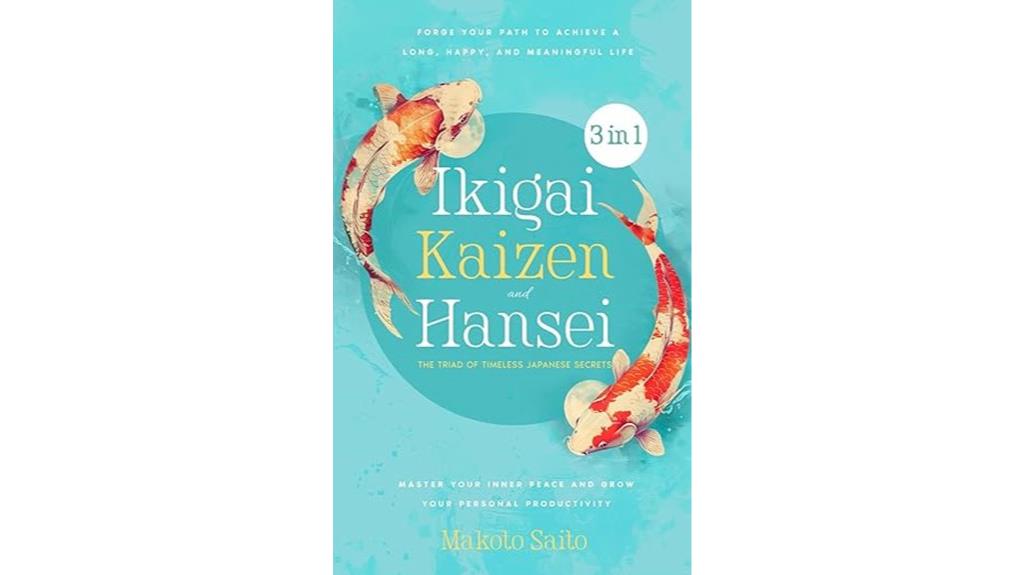
Anyone seeking practical ways to incorporate Japanese philosophies into their personal growth will find the Ikigai, Kaizen, and Hansei book particularly valuable. This book dives into these timeless principles that promote a balanced, meaningful life. Ikigai helps you discover your purpose by aligning body, mind, and spirit. Kaizen encourages small, continuous improvements, while Hansei emphasizes honest self-reflection and growth through evaluating strengths and weaknesses. I appreciate how the book integrates meditation, mindfulness, and self-care practices, making these philosophies accessible and applicable. It’s a concise, inspiring guide to cultivating resilience, fulfillment, and inner peace through Japan’s wisdom.
Best For: individuals seeking practical, accessible guidance on integrating Japanese philosophies like Ikigai, Kaizen, and Hansei into their personal growth and daily life.
Pros:
- Provides clear, concise explanations of complex Japanese philosophies for easy understanding.
- Incorporates practical tools such as meditation, mindfulness, and self-care practices.
- Inspires reflection and continuous improvement, fostering resilience and inner peace.
Cons:
- Cover design and writing style may feel unremarkable or less engaging to some readers.
- Perceived as overpriced relative to the depth and scope of content.
- Lacks extensive historical context or detailed background on the philosophies for those seeking deeper knowledge.
The Ikigai Way: A Simple Path for Living a Life of Purpose
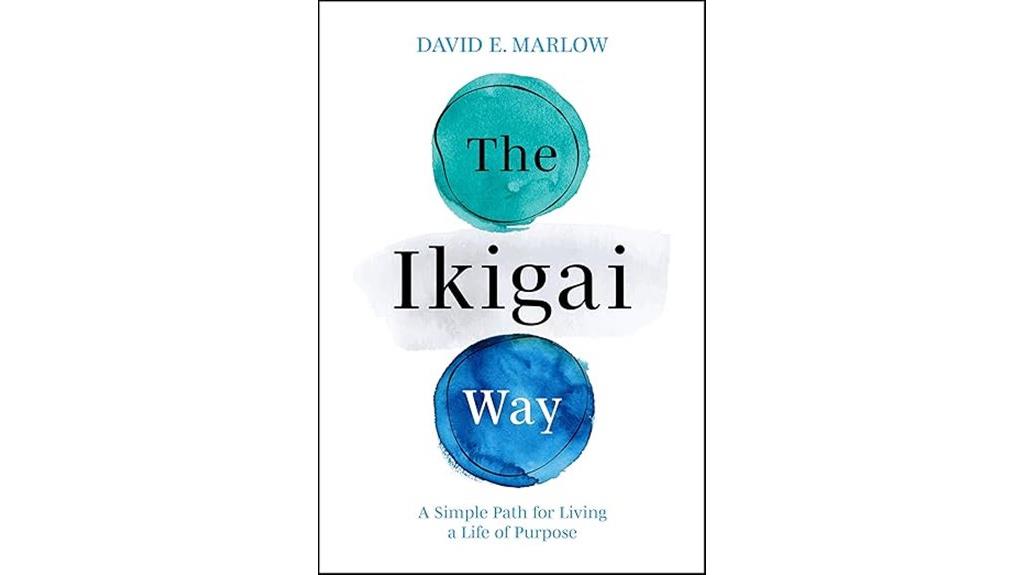
Readers seeking a straightforward, practical approach to discovering their purpose will find “The Ikigai Way: A Simple Path for Living a Life of Purpose” especially valuable. This book offers clear, actionable steps to help you reconnect with what truly matters. It emphasizes small, consistent actions rather than dramatic changes, making it approachable for anyone feeling stuck or out of sync. With practical worksheets, relatable examples, and reflections, it guides you to identify your passions, create an “ikiverse,” and live intentionally. The calm, encouraging tone fosters ongoing growth, helping you find harmony and purpose in everyday life.
Best For: individuals seeking a practical, accessible guide to discovering their purpose and living intentionally through small, meaningful actions.
Pros:
- Offers clear, step-by-step instructions with practical worksheets and relatable examples.
- Emphasizes manageable, consistent actions over dramatic changes, making it approachable for all.
- Provides a calm, encouraging tone that fosters ongoing reflection, growth, and alignment with personal values.
Cons:
- May be too simplified for readers looking for in-depth psychological or philosophical analysis.
- Focuses primarily on personal growth, with less emphasis on immediate organizational or systemic change.
- Some readers might find the emphasis on small actions less motivating if they prefer rapid transformation.
Factors to Consider When Choosing Ikigai Books English
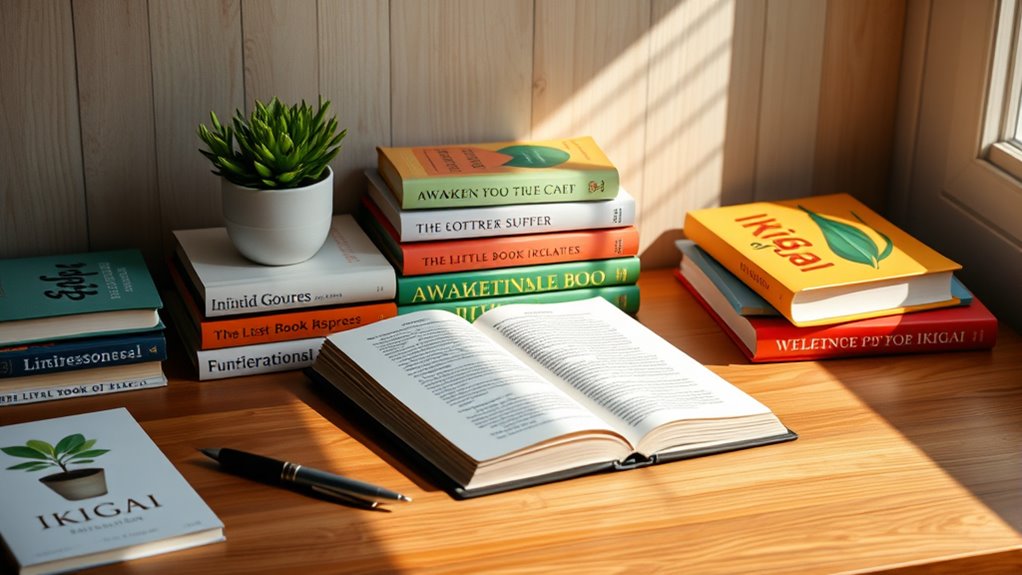
When choosing an Ikigai book, I focus on the authenticity of the content and how well it reflects genuine insights. I also consider the author’s expertise and whether the book offers practical ways to apply the concepts. In conclusion, I look at the cultural context to make sure the ideas resonate and are relevant to my life.
Authenticity of Content
Choosing authentic Ikigai books in English requires careful attention to the content’s cultural accuracy and depth. Genuine books should accurately reflect Japanese philosophy, focusing on core principles rather than superficial or commercialized ideas. Reliable sources often include research, expert insights, or interviews with Japanese practitioners, which add credibility and depth. Be cautious of books filled with repetitive anecdotes or vague advice, as these may lack true understanding of Ikigai’s nuances. Authentic works tend to avoid broad generalizations, instead offering nuanced perspectives that honor Japanese traditions and lifestyle. Authors with cultural expertise or academic backgrounds in Japanese philosophy are more likely to produce trustworthy and authentic content. Ultimately, verifying the source’s credibility helps guarantee you’re learning from a genuine and respectful interpretation of Ikigai.
Depth of Insights
To truly grasp Ikigai, it’s important to look beyond surface-level explanations and seek out books that offer meaningful insights. Deep books go further by including detailed cultural context, real-life examples, and practical exercises that promote genuine reflection. They explore related philosophies like Kaizen, Hansei, or Shinrin-yoku, not just basic definitions, providing a richer understanding. I look for works that cite research, historical backgrounds, or interviews, as these elements enhance my comprehension and ability to apply Ikigai principles. Shallow books tend to focus on motivational quotes and generic advice, offering little in terms of nuanced exploration. The level of insight really makes a difference in how effectively I can internalize and live out the philosophy.
Cultural Context
Understanding the cultural context of Ikigai is essential for appreciating its true depth and origin. It roots itself in Japanese traditions, values, and societal norms, which shape its meaning. Recognizing influences like wabi-sabi, ichi-go ichi-e, and Zen Buddhism enriches our understanding of Ikigai’s philosophical foundation. These concepts emphasize mindfulness, appreciating impermanence, and valuing meaningful moments, all integral to Ikigai’s approach to life. Additionally, Japan’s focus on community, harmony, and longevity influences how Ikigai is perceived and practiced. Being aware of these cultural nuances helps guarantee that interpretations remain respectful, authentic, and relevant. It allows us to see Ikigai not just as a personal pursuit but as a reflection of a rich cultural heritage.
Practical Application
When selecting Ikigai books in English, it’s important to look for resources that actively engage you in applying the concepts. I recommend choosing books that include practical exercises like journaling prompts or reflection questions, which help you internalize the ideas. Look for titles with step-by-step guidance or structured plans, such as 21-day programs, that make integrating Ikigai into daily routines manageable. Prioritize books that offer tools like mindfulness techniques, goal-setting activities, or habit formation strategies to turn theory into action. Furthermore, resources with downloadable workbooks or extra materials can support ongoing practice. Lastly, I find it helpful to pick books that share real-life examples, demonstrating how Ikigai can be woven into different aspects of life for better understanding and implementation.
Author Expertise
Choosing the right Ikigai book in English starts with paying attention to the author’s background and expertise. Look for authors who have a solid understanding of Japanese culture, philosophy, or personal development, as this adds credibility to their insights. An author with academic credentials or professional experience related to Japanese traditions, psychology, or mindfulness practices is often more reliable. Additionally, authors who have conducted original research or interviewed Japanese elders and practitioners tend to offer more authentic perspectives. Their books typically include cultural nuances, historical context, and interdisciplinary knowledge, which deepen your understanding of Ikigai. Prioritizing such authors ensures you gain well-founded, culturally accurate insights that truly resonate with the philosophy.
Visual Aids Quality
High-quality Ikigai books feature visual aids that are not only attractive but also easy to interpret. Well-designed diagrams, charts, and illustrations help clarify complex concepts, making the journey to discovering your purpose more accessible. Look for visuals like Venn diagrams or wheel charts, which effectively show how passions, talents, needs, and opportunities intersect. Good visual aids should be consistent in style, visually appealing, and straightforward to understand, enhancing your learning experience. Poorly executed visuals—blurry images or cluttered diagrams—can confuse you and diminish the book’s educational value. When selecting an Ikigai book, prioritize those with thoughtfully crafted visual aids that reinforce the written content, helping you grasp key ideas more clearly and stay engaged throughout your discovery process.
Book Length & Scope
The length and scope of an Ikigai book can considerably impact your learning experience, so it’s important to match them with your goals. Shorter books typically provide a quick, clear overview of Ikigai, perfect if you’re just starting or need a brief refresher. However, they often lack depth and detailed insights. Longer books tend to cover broader aspects, including cultural context and practical exercises, offering a more exhaustive understanding. The scope also varies—focused books center solely on Ikigai, while broader ones might explore related philosophies like Kaizen or Shinrin-yoku. Consider whether you want a quick introduction or an in-depth exploration, and choose accordingly. Extensive titles demand more time but can deliver richer, more nuanced insights, while shorter ones are more accessible for casual readers.
Target Audience Fit
When selecting an Ikigai book in English, it’s essential to contemplate whether the content is accessible and engaging for your background and familiarity with Japanese philosophies. Confirm the language and cultural references are clear, helping you connect without confusion. Choose a book that matches your current understanding—whether you’re new to Ikigai or more advanced—so you can fully grasp the concepts. Look for titles that offer straightforward explanations and practical exercises tailored for English readers, making the journey more actionable. Also, consider whether the tone aligns with your preferences, whether you prefer inspiration, scholarly insights, or practical guidance. Finally, reviews or summaries can confirm that the content is suited for an English-speaking audience, ensuring cultural nuances are well explained and appreciated.
Frequently Asked Questions
Which Books Best Suit Beginners Exploring Ikigai Concepts?
If you’re just starting to explore ikigai concepts, I recommend beginner-friendly books that break down the idea simply. I found “Ikigai: The Japanese Secret to a Long and Happy Life” by Garcia and Marin very insightful. It’s easy to understand and practical. Another great choice is “Finding Your Ikigai” by Francesc Miralles, which guides you through discovering your purpose with clear exercises. These books make the journey approachable and inspiring.
Are There Recommended Books for Integrating Ikigai Into Daily Routines?
Imagine weaving a vibrant tapestry—each thread representing daily habits that bring you joy and purpose. I recommend “Ikigai: The Japanese Secret to a Long and Happy Life,” as it offers practical tips for integrating ikigai into your routines. It encourages mindfulness and intentional living, helping you discover daily fulfillment. Start small, stay consistent, and watch how your purpose blossoms into a beautiful, everyday masterpiece.
How Do Ikigai Books Differ in Cultural Perspectives?
When exploring how ikigai books differ culturally, I notice that some emphasize Japanese traditions, mindfulness, and community, while others focus on individual fulfillment or Western self-help ideas. I find that these cultural perspectives shape how ikigai is presented, making it either more collective or personal. As I read, I appreciate these differences because they offer varied insights, helping me better understand my own purpose within diverse cultural contexts.
Can These Books Help Improve Mental Health and Well-Being?
Think of these books as guiding stars on your mental health journey. They offer insights and tools to help you find balance, purpose, and resilience. I’ve found that exploring ikigai can illuminate your path, reducing stress and boosting well-being. If you’re open, these books can serve as gentle companions, helping you cultivate a more positive mindset and a deeper sense of fulfillment in everyday life.
Are There Specific Books Focusing on Ikigai for Career Fulfillment?
You’re wondering if there are books on ikigai specifically for career fulfillment. I’ve found that many titles focus on aligning your passions with your work, helping you find purpose in your profession. These books often include practical exercises and inspiring stories. If you’re looking to discover or redefine your career path through ikigai principles, I recommend exploring works that blend personal growth with professional development.
Conclusion
Discovering your ikigai can truly transform your life. Did you know that Japan has one of the highest longevity rates, partly thanks to embracing ikigai? These books are your gateway to understanding and applying this beautiful philosophy. I encourage you to pick one that resonates with you—your purpose might be just a page away. Embrace the journey, and watch how your life flourishes with meaning and happiness.











